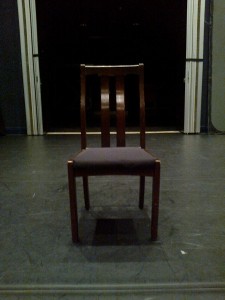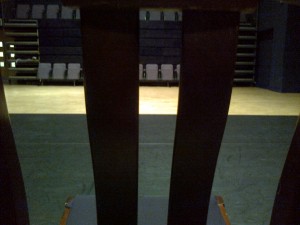Carran’ s Working Diary 9: The Chair of the Board
Practice Day 6:
I have been thinking about despair.
I have been thinking about having nothing.
I have been thinking about a chair.
I have been reading about work in the nineteenth century from Roy Palmer’s Poverty Knock collection of songs
Improvisation with a chair
Practice Day 7
I was thinking about what Roy Palmer said in his book Poverty Knock (1974) about time, song and work. How prior to 1840 “singers look back towards a better time that went before”, then there was “a change of perspective” from 1840 when “singers begin to look forward to a better future, wrested if necessary from a reluctant society.” [1] His main observation is that singers from either perspective demonstrated in their songs a “distaste for the time in which the singer was actually present”.
This brings me back to the Working House (the John Thaw Studio) and the chair work. Travelling on the train this morning I thought about the times people leave for work.
I leave at 7.30 (ish) to catch an 8am train. I usually walk through the now revolving doors of the Martin Harris Centre shortly before 10am.
Robert Palmer quotes A memoir of Robert Blincoe 1832
“Every morning at five a clock the Warden is to ring a bell for beginning to work, at eight a clock for breakfast, at half an hour after for work again, at twelve a clock for dinner, at one to work and at eight to ring for leaving work and all th be lock’d up. (Law Book of the Crowley Iron Works 1700).”[2]
Palmer quotes several examples of such schedules for miners, cutlers, spinners, stretchers, carders, rovers, piecers, weavers, mowers, chainmakers, nailers, waggoners, drawers, thrutchers and of course I imagine the knocker ups.
Looking forward to 1841 he quotes from William Dodd’s observations in Manchester of a factory girl’s day that begins with the knocker up rattling on the window at 4am. At five the bell rings at the factory just as “she leaves the threshold of her home” having taken a drink of cold coffee and a mouthful of bread the rest packed in her handkerchief. After five more minutes she is “in the factory stripped and ready for work”. The engine starts at half past five and she begins her day’s work. At half past seven the engine slows down some food is eaten but the machine does not stop fully and then it continues again at full speed until 12 noon when after cleaning her machine she walks home at 12 thirty for her dinner before which she washes herself leaving little time to eat and pack up a drink for the rest of the day. She returns to work for 1 o’clock and is there until she is home again around 7 o’clock and “throws herself into a chair exhausted”. This she does six days a week. Saturdays she sometimes gets back an hour or two earlier. The observer is not surprised she doesn’t want to get up for church on the seventh day.[3]
These examples of course are not songs they are personal accounts.
I then began to think about the words Poor Relief and that word relief sounding more palatable, like it is freeing you from the despair and exhaustion of being poor.
Poor Relief it seems reduced with the new Poor Law Act of 1834 where people no longer went for relief to the church poor houses but they became part of a new system of classification and were to be known as inmates of the workhouse, a kind of industrial system or factory system: Houses of Industry. You become defined by your work and the pecking order of work is a refined system: Unmarried mothers with illegitimate children work in the laundry washing away the dirty linen. “Idle” tramps and vagrants do stone breaking or oakum picking. I used to think this was something to do with oak trees but I now know it’s a finger punishing task of picking tar from old rope – money for old rope. However in this case, keep and not money was the reward and often oakum picking was a punishment for absconding with the workhouse uniform or cheeking the master and other such sins.
Looking back it would seem the time before the creation of the Workhouses and the factories life may have been more idyllic. The time before the enclosures, when you could walk free and not be pinned to a certain parish.
What makes us as human beings create systems that organise ourselves into claustrophobic routines?
Why do we love and hate work?
Why do I come to this room and move the chair about in a routine manner? I have an over-riding sense of the purpose that the routine, the exercise has meaning and will lead to creativity, I am lucky I play for my work. But it’s still hard and it’s still routine and it often feels pointless. I don’t have a boss to tell me what to do so it’s not easy at all. I got home at 7pm. I have left home at 5.30am to do a job that is a 3 and a half hour drive away. I pay for my keep out of the pay I receive for the project. The fundamental difference is that I have a choice and I am not a “slave”. The people I am reading about are a part of the extended family of a “slave trade” that includes more than cotton pickers.
If you are a little boy down a mine sitting on your heels opening the draft door for the next waggon from dawn to till dusk what is your over-riding sense of purpose? Is there time to think, imagine, conceive there?
And so to time and the song and the distaste for the time in which this singer is actually present:
During Yoga in my head I thought of the title The House is Open. or The House Is Now Open
I thought for a while I could call it Nana in Hospital – my family and the workhouse – a research performance by Carran Waterfield but that narrows it a bit too much to personal history. I want resonance and layers in this piece that will be open to interpretation. I want to play with time. I want to play with meaning.
I have gone back to basics: no props except the chair, only use my laptop till the battery runs down, no music, no projection; just me, the yoga mat and the chair.
So The House is Now Open is more of an invitation for you to come in and take a look, stay for a while like Goldilocks did poking about with the stuff belonging to the three bears and then go.
I am poking about in the stories, songs and factual information concerning the poor.
I have made these connections:
Mum was born under the National Assistance Act – 100 years after the Poor Law Reform bill of 1834.
The Elves and the Shoemakers, nailers and mum’s party song for the visiting committee at the children’s home are important elements.
The chair and the big fat book are important.
Singing in the voices of different people and somehow developing a repertoire of songs is important.
Knowing about work and loss of work is as important as knowing about the workhouse. Living on a threshold of poverty is very important to know about.
Living on the precipice of an abyss. Falling into a big black hole.
Working = being poor for some
Working = being privileged for some
Not working = being poor for some
Not working = being privileged for some
From:
Poverty Knock
The Knocker up pg. 13
The Carpet Weaver’s true tale pg. 21
Nailer’s song pg. 26
The Nailmaker’s Strike pg. 29
The Collier Lass pg. 44
Working Songs[4]
Industrial ballads and poems from Britain and Ireland 1780s – 1980s
Pages 51-57 about children working from aged 5. The beginnings of education for everyone raising of the school leaving age which began with the half timers rulings when children worked in the morning and did school in the afternoon and then the stuff about Sunday Schools. How religious fervour can get in the way of real change and rights.
The Testimony of Patience Kershaw Pg. 57
The black hole is the pit you see – that is the abyss that Mary Higgs glimpses[5] – connotations of blackness and poverty, dirt and squalor and squeaky clean white wash.
The Clothier’s Delight Pg73
The Four Loom Weavers or Jone O’ Grinfield Pg. 85 (and various versions including Maddy Prior and June Tabor
Singing a Pleading Song Chapter 8 (Want of Employment)
Read going home
Practice Day 8
Routine
What is a working routine?
What is a workhouse routine?
My routine today:
Awoke at 3.40am went back to sleep.
Woke again at 6.15am
Cup of peppermint tea
Richard is making porridge so not just the banana today
Shower
Porridge add the frozen summer fruits
drink last night’s Badoit mineral water and take vitamins – cod liver oil, magnesium citrate and vitamin D
7.15 am finish breakfast, check bag add another book The House on the Hill[6]
Fill new water bottle
Teeth and hair
7.40am leave house
Train arrives (on time!) 8.02pm
Read rest of Chapter 8 and chapter nine from Working Songs[7] till Salford Central.
9.15 walk to Manchester Uni
9.45 walk through revolving doors
Toilet – upstairs they are decorating the downstairs ones.
9.50 enter the Working House.
Set up Table, Chair, The Chair, Yoga Mat, laptop, hard drive, books
Change into work clothes
10.00 – write this.
I have been thinking about making a list of words that are important to the project.
[1] Palmer, Page 5
[2] Palmer, Page 4
[3] Palmer Page 16
[4] Heron Publishing 2010
[5] Glimpses in the Abyss Higgs, Mary P.S King and Son 1906
[6] Hardy, Sheila 2001
[7] Ibid



Comments are closed
Sorry, but you cannot leave a comment for this post.